
In March 2016, the SAT underwent a complete redesign, concentrating more on testing reasoning skills than on obscure vocabulary knowledge.
So how do you study for the SAT now that there just aren't that many practice tests available? After all, there’s nothing quite like taking actual official SAT tests to get you ready for the real thing. The good news is that many of the questions that appeared on the old SAT format are still completely relevant and a great resource for practicing your skills!
In this article, I'll tell you all about which old-format questions to seek out and which to skip. Then I'll give you a huge list of the best places to find free official SAT tests to use for studying.
Feature Image: Ed Schipul/Wikipedia
What’s the Difference Between the “Old” and New SAT?
Big-Picture Changes
The SAT no longer tests your knowledge and skills in isolation. Instead, the College Board has made context and reasoning matter much more for questions.
For example, instead of testing whether you know a grammar rule by giving you several unrelated sentences, multiple grammar questions now come from a single passage. Also, there are no “trick” questions - in other words, questions with purposefully confusing wording meant to trip you up even if you did actually know the skill being tested.
To see a detailed explanation of all the changes, check out our extensive guide to the new SAT.
Small-Scale Changes
On a more granular level, although each SAT section has been redesigned, different sections have been changed in different degrees. This is great news! For many new SAT sections, old SAT question are still a relevant and useful study resource.
In the rest of the article, I will go through each section and explain which old SAT questions you can use to study. But first, I have some general advice about how to get the most benefit out of the old SAT as you prepare for your SAT exam.
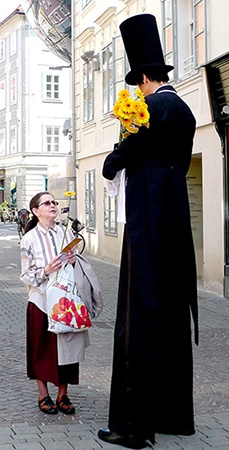 It's the small things that make up the big things. Like the yellow flowers in that bouquet. (E.mil.mil/Wikipedia)
It's the small things that make up the big things. Like the yellow flowers in that bouquet. (E.mil.mil/Wikipedia)
Can You Really Use the Old SAT to Study for the Current One?
However you end up studying for the SAT (check out our guide to finding the best testing strategy for you), you will certainly use these two techniques:
- boosting weak skills by practicing many questions that test those skills
- simulating testing conditions by taking a full SAT test in one sitting
Because the format and timing of the old test are fairly different, it can't really help you with test-day conditioning – use the current SAT tests for that. But since many of the questions and question types remain the same, the old tests are excellent for honing individual skills.
As much as possible, you should use official SAT tests from the College Board rather than those written by other companies. Because they have gone through the same writing and editing process as the questions you'll encounter on the actual test, these old tests come closest to reproducing what you will encounter on test day.
Also, because they have been officially released by the College Board, there is no question about their quality. On the other hand, it's not always clear whether another company can sufficiently mimic the College Board's approach, style, or wording. By sticking with the official tests, you don’t have to worry about evaluating third-party work.
Finally, please note: the SAT underwent a big redesign in 2005 as well. So when talking about the old tests below, I will say "pre-2005" and "post-2005" to differentiate between the two old versions of the SAT.
Which Sections of Old SATs Should I Use to Study?
Here’s a breakdown of all of the SAT sections, in order from least to greatest difference between the old and current tests, as well as explanations about how you can effectively use older tests to study.
Math Section
The math section is the most unchanged. There is less geometry on the current SAT than on the old ones, and some basic trigonometry has been added. Also, there's now a no-calculator section.
Current SAT Question Types:
- a small number of trigonometry questions
- more questions about interpreting graphs and charts
- multiple-step questions based on a real-world scenario
Old Questions to Study:
- Almost all math problems from old tests. There's no need to pick and choose very much, so feel free to study almost all math questions you come across.
Old Questions to Skip Entirely:
- Comparisons (pre-2005 tests). These are questions that ask you to compare the value of two boxes:

- Logic puzzles (all old tests). These are questions not directly based on math you learned in school. If you can confidently identify these types of questions, skip them because they do not appear on the current test. For example:
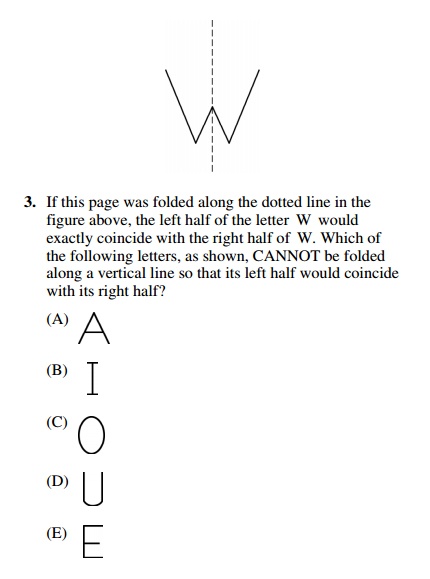
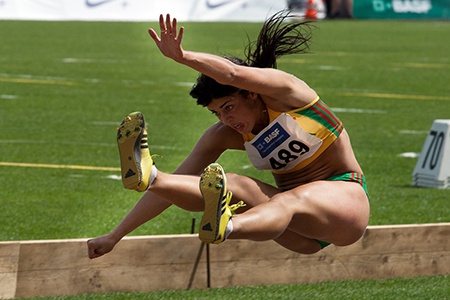 After public resistance, the controversial new "do a long jump while computing the distance of your long jump" task has been tabled for now.
After public resistance, the controversial new "do a long jump while computing the distance of your long jump" task has been tabled for now.
Writing and Language Section
The old Reading and Writing sections are now one section called "Writing and Language." It still has questions about reading comprehension, grammar, and vocabulary. But all questions are passage-based and rely on your ability to determine meaning from context.
Current SAT Question Types:
- all reading questions are based on passages
- grammar and writing logic questions are also all passage-based
- some questions require interpreting data (in graph or chart form)
Old Questions to Study:
- Passage-Based Reading (all old tests). The current-test version of these is not exactly the same, but they are still great practice for learning to quickly find the meaning and argument structure of a given passage.
- Improving Paragraphs (post-2005 tests). These ask you to read a passage and then edit its grammar and logic:
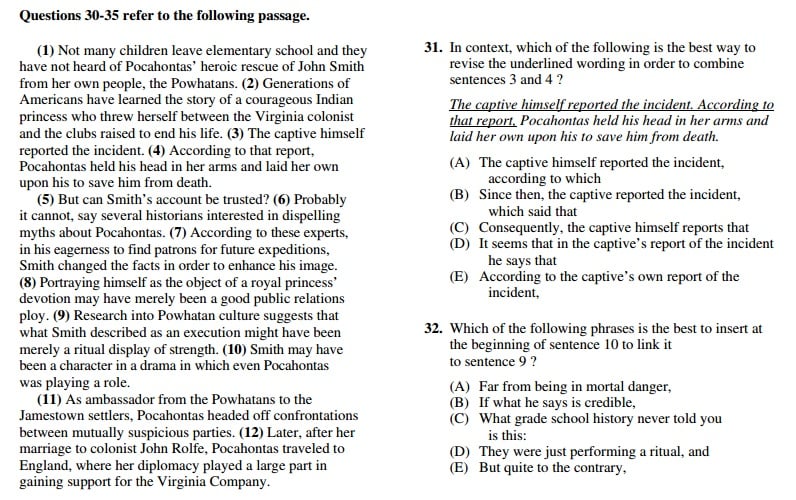
Old Questions to Use to Brush Up on Key Concepts:
The old isolated-sentence grammar and syntax questions are now less helpful, but you can still use them to refresh your understanding of proper usage, grammar, and punctuation. Just don't use them as real test practice.
- Sentence Errors (post-2005 tests). These ask you to identify a grammar or punctuation mistake in an isolated sentence:
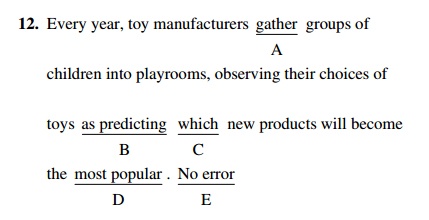
- Improving Sentences (post-2005 tests). These ask you to edit isolated sentences:
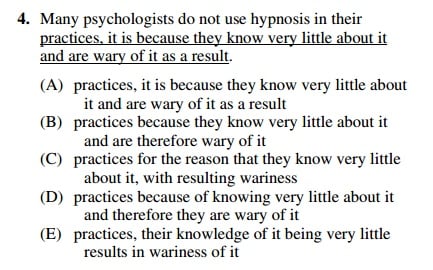
Old Questions to Skip Entirely:
- Analogies (pre-2005 tests). These ask you to compare the relationships of paired words:
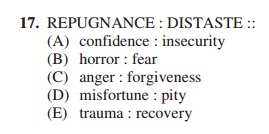
- Sentence Completions (post-2005 tests). These ask you to find the best words to fill blanks in sentences:
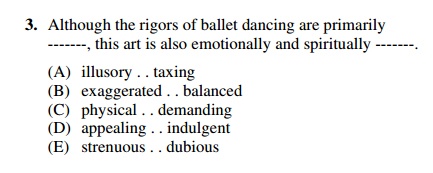
 Feel free to also skip any questions from the pre-1369 A.D. version of the SAT.
Feel free to also skip any questions from the pre-1369 A.D. version of the SAT.
The Essay Section
The current essay is 50 minutes long, and it is much closer to the kind of analytical writing you've been doing in high school all along.
The essay gives you a passage and then asks you to write about how the author builds the argument. This is one place where the old tests simply will not help. Instead, you should brush up on your understanding of rhetorical devices, structure, and the uses of evidence.
 The study of rhetoric apparently involves both a book, an enormous fighting staff, and maybe... a feather on your head? You've been warned.
The study of rhetoric apparently involves both a book, an enormous fighting staff, and maybe... a feather on your head? You've been warned.
Free Old Tests From the College Board
Post-2005 Tests:
- SAT Practice Test (2013-2014) Test | Answers
- SAT Practice Test (2012-2013) Test | Answers
- SAT Practice Test (2007-2008) Test | Answers
- SAT Practice Test (2005) Test | Answers
Pre-2005 Tests:
- SAT Practice Test (2004) Download | Answers
- SAT Practice Test (2003-2004) Download | Answers
- SAT Practice Test (May 2002) Download
- SAT Practice Test (October 2001) Download
Other Potential Sources of Old SAT Tests
The book The Official SAT Study Guide, Second Edition, which features 10 more official SAT tests from the College Board. The book is not free (it's currently $45 new on Amazon, though you can get it for much cheaper used).
On the other hand, the internet is a vast and wondrous place, and you may be able to find slightly less authorized but nevertheless completely official old SAT tests if you poke around a little. Try searching for "free old SAT tests" and looking past the first couple of pages of Google results to the less commercial corners of the web.
 "Which corner is least commercial?" asked the fly. "Try the middle," replied the spider.
"Which corner is least commercial?" asked the fly. "Try the middle," replied the spider.
Conclusion
Old SAT tests still have an important role to play as you study for the SAT. To simulate test-day conditions, definitely use current official tests. But old tests are perfect for extra practice with realistic reading passages and math questions.
What’s Next?
Wondering how best to study for the SAT? Download our dedicated guide to figuring out which SAT prep method is best for you.
Worried that the SAT is not the right test for you altogether? Let us help you decide between the SAT and ACT by explaining which students should take which test.
These recommendations are based solely on our knowledge and experience. If you purchase an item through one of our links, PrepScholar may receive a commission.












